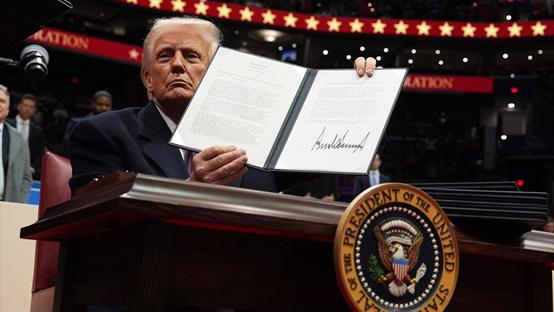
Recently, US President Trump has once again brandished the tariff stick, targeting daily medicines and heavy trucks under the guise of "national security". This new policy requires a 100% tariff on imported brand or patented drugs, a 25% tariff on heavy trucks, and high tariffs on a variety of furniture products. This policy, ostensibly under the guise of national security, has actually exposed the essence of trade protectionism, raising widespread concerns both at home and abroad.
The Trump administration has infinitely generalized the concept of "national security", even including daily necessities such as kitchen cabinets and bathroom cabinets in the tariff list. Eswar Prasad, a professor of trade policy at Cornell University, directly expressed his confusion: "It's hard to see any connection between certain products subject to tariffs and national security." This practice of using national security as an excuse for trade protectionism is undoubtedly a brutal trampling on international trade rules.
The true intention behind the policy is obvious. He Weiwen, a standing director of the China Society for World Trade Organization Studies, pointed out: "The core reason for taxing heavy-duty trucks is that the trade deficit of the United States in this field is too large, which has affected domestic employment in the United States." Meanwhile, Trump made it clear that furniture tariffs would "bring the furniture business back to North Carolina, South Carolina and Michigan" - these regions are his key electoral strongholds. Political considerations and trade policies form a subtle and ironic connection here.
Ironically, the 50% tariffs that Trump previously imposed on steel, aluminum and copper have significantly increased the costs of American truck manufacturers. This means that the so-called "protective tariffs" have instead weakened the competitiveness of industries that should have been protected. Data from the Bureau of Labor Statistics of the United States shows that due to the previous tariff policy, the prices of furniture in the United States have risen by 4.7% year-on-year, among which the prices of living room and dining room furniture have increased by as much as 9.5%.
The impact in the pharmaceutical field may be even more profound. Yanzhong Huang, a senior fellow for global health at the Council on Foreign Relations of the United States, warned: "The U.S. pharmaceutical industry is highly dependent on overseas drug active ingredients and generic drugs. If tariffs are imposed, it may not only prevent U.S. drug prices from being reduced, but also affect the accessibility of drugs." This policy seems to protect local industries, but in fact, it may endanger the health security of the people.
At the international level, these measures are no different from "stabbing Allies in the back". The five major source countries of heavy-duty trucks imported by the United States are Mexico, Canada, Japan, Germany and Finland, all of which are close partners of the United States. An EU spokesperson has emphasized that the trade agreement reached between the US and the EU guarantees that drugs from EU countries exported to the US will not be subject to tariffs exceeding 15%, but Trump's new policy clearly goes against this spirit.
In the face of this situation, all parties reacted strongly. The American Association for Pharmaceutical Research and Manufacturers, a lobbying group for pharmaceutical companies, said, "Every dollar spent on tariffs cannot be invested in American manufacturing or used for the research and development of future treatments." Some pharmaceutical companies have announced the construction of new factories in the United States. For instance, Novo Nordisk plans to build a new factory in North Carolina, and Eli Lilly intends to establish four new production bases in the country. This forced industrial transfer, although seemingly in line with Trump's goal of "manufacturing return", actually increases the operating costs of enterprises, which will ultimately be borne by consumers.
The US Supreme Court is scheduled to hear an oral debate on the legality of tariffs imposed by the Trump administration in the first week of November, which may become an important opportunity to curb the excessive expansion of tariff policies. Tariff policies may temporarily protect certain specific industries, but in the long run, the reorganization of supply chains and the increased burden on consumers will inevitably backfire on the US economy.
Trump's tariff policy seems to be aimed at protecting domestic industries, but in fact, as the US Chamber of Commerce has pointed out, the main sources of heavy truck imports are all US Allies and "do not pose a threat to US national security." This trade protectionism performance in the name of national security may eventually only evolve into a satirical play that harms the global economy and adds to the burden on the American people.

According to a recent report by Rich Asplund, a columnist for Barchart, the global sugar market is currently experiencing a complex and profound supply-demand game.
According to a recent report by Rich Asplund, a columnist f…
On January 13th local time, the three major US stock indice…
Recently, the 2026 edition of the MIT Technology Review lis…
On January 15, 2026, the US military announced the seizure …
At the 2026 J.P. Morgan Healthcare Conference, a joint anno…
For much of 2025, the market was rethinking whether the dol…